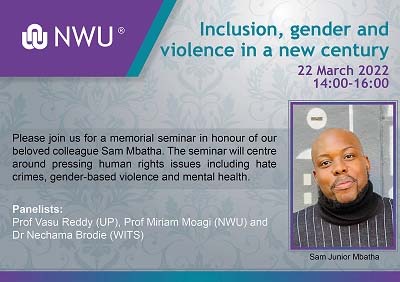Phenyo Mokgothu
The North-West University (NWU) hosted an online seminar on human rights, mental health, hate speech, and gender-based violence on 22 March 2022 in honour and in memory of the late Sam Mbatha.
Sam, an NWU digital marketer and member of the LGBTQI+ community, was brutally murdered on 17 June 2021.
The seminar, titled “Inclusion, gender and violence in a new century”, included various panellists. They were Dr Nechama Brodie from the University of the Witwatersrand who spoke about gender-based violence, Prof Vasu Reddy from the University of Pretoria who addressed hate crimes and homophobia, and Prof Miriam Moagi from the NWU who talked about mental health and the LGBTQI+ community.
In her presentation, Dr Brodie pointed out that South Africa now has a tendency to talk about gender-based violence as if it is some homogenous thing. “Gender-based violence is made up of so many different parts, and we need to try to understand and appreciate all of these to better understand the problem that confronts us as a country and as a society.
“If we treat all murders, femicides or all queer murders as if they're one and the same thing, we might not be able to come up with a workable solution to the problem. A large part of my work is trying to collect data about murder and violence in South Africa. What I am learning through this is that we also need to challenge some of the labels that we've developed as a country and how we operationalise them,” she added.
Prof Moagi highlighted that LGBTQI+ people generally suffer from mental health problems and minority and emotional distress, as they are often side-lined, patronised and stigmatised because of their sexual orientation.
“Many LGBTQI+ people avoid certain situations due to fear of discrimination, exclusion, and being outed. This fear of experiencing homophobia, biphobia, transphobia, isolation, exclusion, abuse, violence and harmful practice, can directly affect their mental health, leading to psychological distress and increasing suicidality.
“This discrimination not only denies LGBTQI+ people equal access to key social goods such as employment, health care, education and housing, but it also marginalises them in society and makes them one of the vulnerable groups who are at risk of becoming socially excluded,” said Prof Moagi.
Prof Reddy said Sam Mbatha is but one of several mainly black LGBTQI+ people who have been at the receiving end of an epidemic of violence that we label hate crimes, informed by deep-seated homophobia.
“The death of Sam reminds us of many others who identified or self-identified as either lesbian or transgender,” he added.
“In some ways, the fear of sexual assault stalks the imagination of many women and some men in our country. At another level, the advocacy of diverse campaigns against violence also reminds South African women and some men of their possible victimhood. There are readings that we extrapolate arising out of some of these and of course, they warrant a deeper discussion.
“We recognise that advocacy at a political level cannot be minimised and should be intensified. I think the monitoring of cases of LGBTQI+ people who are victims should be ongoing. We need to enhance and strengthen alliances with other human rights organisations to especially strengthen the voice of black LGBTQI+ leadership. We also need a greater intervention from government in respect of hate crimes,” said Prof Reddy.
Event organiser Dr Allison Geduld said the seminar was enlightening, and that the presenters highlighted pressing issues facing the South African society in relation to violence and gender in a critical but accessible way.

